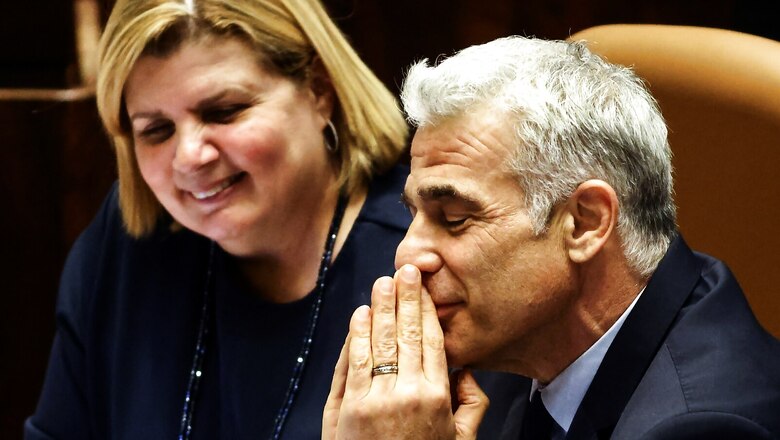
views
As the Israeli coalition government collapses due to its failure to pass legislation to extend Israeli criminal and some civil law to the Israeli settlers in the occupied territory of the West Bank, the provisions that were first introduced through “emergency” legislation in the aftermath of the 1967 war — also called the Judea and Samaria law — and have been renewed every five years since. Though Israel has not annexed the West Bank, this emergency measure ensures that settlers living there are treated as though they live in Israel in most matters without extending those same legal arrangements to Palestinians.
The current collapsed government was a coalition of two blocs: Three rightist parties, managed by former Prime Minister Naftali Bennett, the leader of the Yamina party, representing the land of Israel hard-liners; and four centre and left parties, managed by the now caretaker Prime Minister Yair Lapid, the founder of the Yesh Atid party, with the support of a moderate conservative Islamist party called the United Arab List (also called Ra’am in Hebrew) led by Mansour Abbas.
In this light, the questions that arise are: What exactly is this Judea and Samaria law that has toppled the Israeli coalition government in power for the last year? And what lies ahead for coalition parties in Israel and in general the conflict-prone areas?
The Judea and Samaria law that is the root cause of the collapse is a domestic law of Israel. Israel applies its domestic laws to the Israelis in the settlements on the West Bank. These laws apply only to Israeli civilians in Area C of the West Bank which is often referred to by the United Nations as the disputed occupied land of Palestine. Israel applies military laws to the rest of the people living in these disputed lands. Such Israeli laws don’t apply to the territory of the West Bank, but rather only to Israeli civilians inhabiting the region. These laws create enclaves in Israel-occupied Palestine. They are known as ‘enclave laws’ and ‘enclave-based justice’.
The territorial jurisdiction aspects of ‘enclave law’ are implemented through the process of pipelining. Through this system of ‘pipelining’ the Palestinians are subjected to military laws or some local Jordanian laws. The military rules are primarily in the West Bank but ‘Israel military orders’ apply to Israel laws, especially to the Israel settlement in local councils. This dual system law may be an example of the possible Israeli practice of apartheid in the region.
What needs to be understood is that political parties play an important role in the management of conflict in societies divided along cultural, linguistic, religious, regional, or other lines. In simple terms, a political party is an organised group possessing common views on governance that aim to further their agenda and policy through political power. They mobilise the electorate, set agendas, and indulge in political propagation.
The significance of the present coalition, which was not given a chance of surviving for even a year was that all of the main warring parties were incorporated into the political system, which should have developed vested interests in its stability and proper functioning. However, since the cooperation was shallow, the political will needed to implement large-scale projects or govern effectively remained absent, which is against the need for stability of the rules governing the social, political, and economic quality of the lives of ordinary people.
At the larger level, a constitutional framework must be established for political parties in Israel and in general the conflict-prone areas. Inspiration may be sought from the West such as the Basic Law of the Federal Republic of Germany (1949) that gives constitutional status to political parties. For example, Article 21 of the Basic Law deals with their status, rights, duties, and functions and states that their internal organisation must conform to democratic principles. They must publicly account for their assets and for the sources and use of their funds.
Similarly, in the UK, the Conservative Party has the National Conservative Convention as its top body. It has a Central Council and an Executive Committee. In the US, both the Democratic and Republican parties have the National Committee as their top decision-making body.
These proposed changes assume significance especially for Israel as it is a parliamentary form of democracy where the executive is drawn from the legislature in the form of the Council of Ministers that not only are responsible for the specific ministries, but also are Members of Parliament representing the will of the people.
Abhinav Mehrotra is Assistant Professor, OP Jindal Global University. Dr Biswanath Gupta is Associate Professor, OP Jindal Global University. The views expressed in this article are those of the author and do not represent the stand of this publication.
Read all the Latest News, Breaking News, watch Top Videos and Live TV here.




















Comments
0 comment